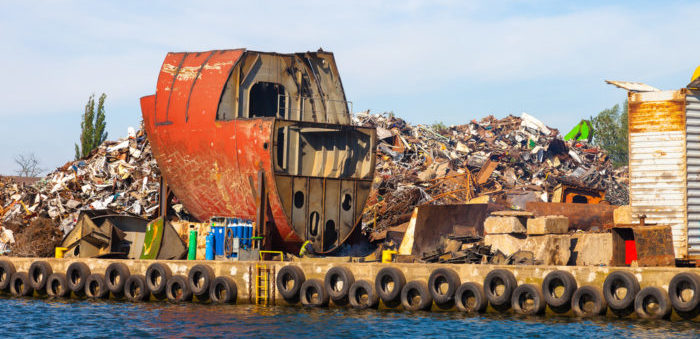Following journalistic investigation, the Icelandic authorities have brought to the public prosecutor a case of illegal export of the container ships GODAFOSS and LAXFOSS to the Indian beach of Alang for dirty and dangerous scrapping.
In a documentary broadcasted by radio and television Ríkisútvarpið (RÚV) last week, Icelandic program Kveikur released an investigation on the murky sale of two ships owned by Icelandic company Eimskip.
You feel sad and, at the same time, angry that a company in the West would exploit vulnerable people that have no choice but to work under such horrible conditions. Workers are at constant risk of accidents and even losing their life, and environmental issues are given zero attention,
…said Iceland’s Environment Minister Guðmundur Ingi Gudbrandsson, in response to Kveikur’s documentary.
As part of its fleet renewal, Eimskip sold the GODAFOSS and LAXFOSS at the end of 2019, while simultaneously agreeing with the buyer GMS to charter the ships back until the company’s new-buildings were delivered. What may have seemed like a sale for further operational use was actually a scrap deal, reports by NGO Shipbreaking Platform reveal.
On their part, Eimskip denies any involvement in the decision to sell the ships for recycling and claims having been in the dark about their final destination.
The export of the two container vessels to South Asia was a clear breach of European waste laws, which prohibit the trade of hazardous waste, including end-of-life ships, from OECD countries to non-OECD countries.
Both the GODAFOSS and LAXFOSS were in European waters when the decision to sell for scrap was taken. Before reaching the Indian beach of Alang, via Suez, they briefly stopped in Rotterdam and Athens respectively.
At the time of the export of the ships, the NGO Shipbreaking Platform formally requested Icelandic, Dutch and Greek authorities to hold all the parties involved in the sale accountable for breaching EU waste legislation.
In 2019 alone, at least 14 vessels were sold to beaching yards in breach of the EU Waste Shipment Regulation. The Icelandic case adds itself to several ongoing criminal investigations.
See also: EU Ship Recycling Regulation and IHM: How to comply
































































